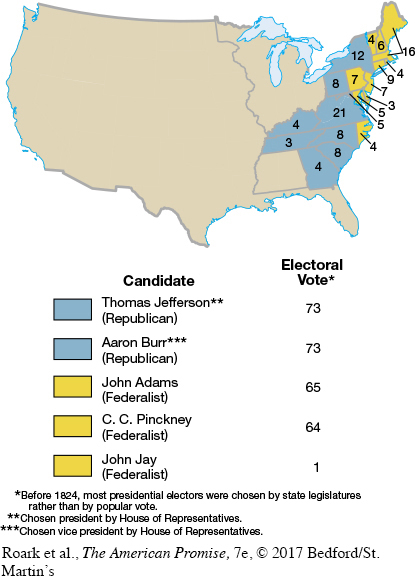The American Promise: Printed Page 255
The American Promise, Value Edition: Printed Page 235
The American Promise: A Concise History: Printed Page 266
Turbulent Times: Election and Rebellion

The election of 1800 (Map 10.1) was historic for procedural reasons: It was the first election to be decided by the House of Representatives. Probably by mistake, Republican voters in the electoral college gave Jefferson and his running mate Senator Aaron Burr of New York an equal number of votes, an outcome possible because of the single balloting to choose both president and vice president. (To fix this problem, the Twelfth Amendment to the Constitution, adopted in 1804, provided for distinct ballots for the two offices.) That meant that the House had to choose between those two men, leaving the Federalist candidate, John Adams, out of the race. The vain and ambitious Burr declined to concede, so the sitting Federalist-
Some Federalists preferred Burr, believing that his character flaws made him susceptible to Federalist pressure. But the influential Alexander Hamilton, though no friend of Jefferson, recognized that the high-
Thirty-
The American Promise: Printed Page 255
The American Promise, Value Edition: Printed Page 235
The American Promise: A Concise History: Printed Page 266
Page 257As the country struggled over its white leadership crisis, a twenty-
One of the jailed rebels compared himself to the most venerated icon of the early Republic: “I have nothing more to offer than what General Washington would have had to offer, had he been taken by the British and put to trial by them.” Such talk invoking the specter of a black George Washington worried white Virginians, and in the fall of 1800 twenty-